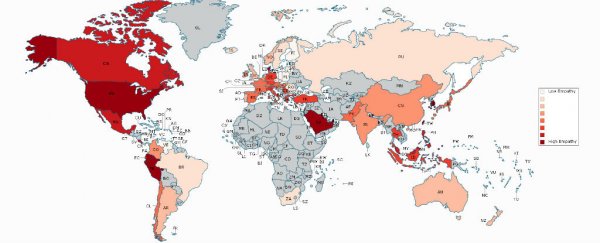For the first time, scientists have ranked nations by the empathy of their people, and according to data collected from 104,365 adults across 63 different countries, Ecuador is the most empathetic country in the world, followed by Saudi Arabia and Peru.
The study, which placed the US at no. 7 on the list, measured the locals' compassion for others and their tendency to imagine another person's point of view. Lithuania was ranked as the least empathetic country of the bunch.
Conducted by researchers from Michigan State University, the study has been described as the most comprehensive and descriptive understanding of empathy around the world to date.
Based on online surveys completed by more than 100,000 representatives, it looks at the links between empathetic feelings and various personality traits and 'prosocial' behaviours, such as volunteering and charitable donations.
"To our knowledge, this study is by far the largest examination of cultural differences in empathy, with respect to both the number of individuals and the number of countries represented," the researchers conclude.
Here's the top 10:
- Ecuador
- Saudi Arabia
- Peru
- Denmark
- United Arab Emirates
- Korea
- United States
- Taiwan
- Costa Rica
- Kuwait
The countries with the lowest Total Empathy scores were Lithuania, Venezuela, Estonia, Poland, and Bulgaria, with the team finding that seven of the 10 least empathetic countries were in Eastern Europe.
You can see the rankings of other countries in the map at the top of the page. (Larger version here.)
The researchers defined empathy as the tendency to be psychologically in tune with others' feelings and perspectives. To measure this in the participants, they asked them to complete a comprehensive list of questions drawn from several standardised tests.
These tests assessed each person's empathy, basic personality traits, prosociality, and individualism/collectivism - meaning if they prefer loosely knit social networks and individuality, or tightly knit social networks and interdependence with others.
They also measured each individual's self-esteem and feelings of wellbeing.
The volunteers were asked to rank a series of statements ranging from, "I often have tender, concerned feelings for people less fortunate than me," to "On the whole, I am satisfied with myself."
They were asked how happy they felt with their lives, and how often they donated money to an organisation, volunteered time to an organisation, or helped a stranger. Personality traits such as agreeableness and conscientiousness were also assessed.
The results showed that 'collectivistic' countries - meaning those with participants that preferred tightly knit social groups and interdependence - were higher in empathy, and empathy across each country's volunteers was linked with agreeableness, conscientiousness, self-esteem, subjective well-being, and prosocial behaviours.
Being the first such study attempting to assess empathy on such an enormous scale, there are a number of limitations that should be taken into account.
There's the fact that the surveys were all conducted in English, and that the results relied on self-reporting by the volunteers. The study also did not distinguish between feelings of empathy toward people in the participants' own country versus those in other countries.
The researchers also emphasised that this is just "a snapshot of what empathy looks like at this very moment", and say they expect the values for each country to shift in the coming years.
But despite the limitations, the researchers say the results give us a crucial insight into how empathy is expressed in different cultures - and gives future researchers are far more diverse sample to work with when examining empathy.
"Despite the strong influence that culture has on how we relate to others around us, researchers have generally relied on samples of North American college students when studying empathy," they explain.
"Given the important role of empathy in everyday social life, we hope that the current study will stimulate research examining how empathy is expressed in different cultures and social settings, and help inform future research on the relationship between empathy and culture from a broader and a more representative perspective."
The results have been published in the Journal of Cross-Cultural Psychology.
